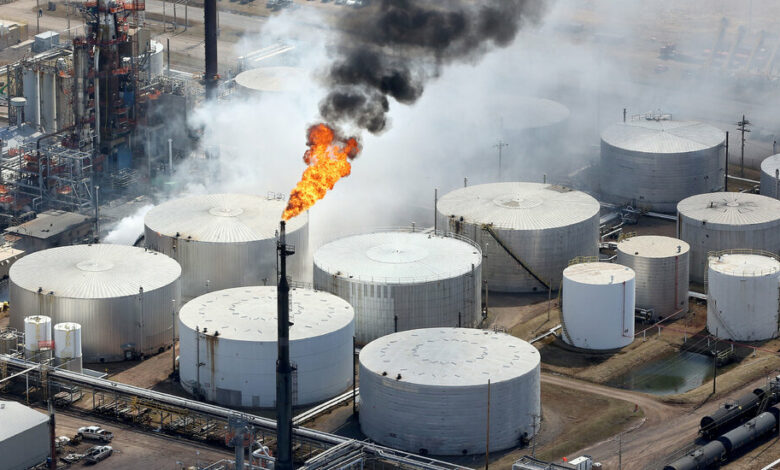A seismic ruling from the Supreme Court

On Friday, the Supreme Court drastically limited the oversight authority of federal agencies, upending 40 years of legal precedent in a ruling with far-reaching implications for the environment.
The court rejected the so-called Chevron deference, one of the most cited precedents in American law, which has led courts to defer to the expertise of federal agencies in interpreting unclear statutes. Instead, the justices ruled, courts should have greater power to interpret these statutes.
As our Times colleagues wrote, environmentalists fear the decision could lead to hundreds of rules being weakened or eliminated, notably the Environmental Protection Agency’s limits on air and water pollution, regulations on toxic chemicals and policies to address climate change.
The ruling is a major victory in a decades-long effort by conservative organizations to roll back the federal government’s regulatory powers. Mandy Gunasekara, who served as EPA chief of staff under President Trump and is a fellow at the Heritage Foundation, welcomed the court’s decision. “It creates a tremendous opportunity to challenge these regulations,” she told The Times. “And it could provide additional momentum to rein in the administrative state more generally if the administration changes in November.”
To find out what might happen next, we reached out to climate experts, legal experts, and activists. We asked each expert about the implications of the ruling and how it might affect Americans’ lives.
Below is a summary of the responses:
How could daily life change?
Manish Bapna, Chairman of the Natural Resources Defense Council: “The Court’s actions have seriously jeopardized the fundamental guarantees we rely on, and even take for granted, to protect the pillars of modern society. Clean air and water; healthy wildlife and land; safe food, medicine, workplaces, planes, bridges and automobiles; an economy unencumbered by predatory lending, stock market fraud and credit card fraud.”
Tara Brock, Pacific Legal Director and Senior Counsel, Oceana: “Unfortunately, any decision that undermines environmental protection will harm Americans’ health and their wallets. The danger of this decision is that more Americans will suffer the worse effects of climate change, air pollution, and other environmental harms, and will also suffer other harms that government regulations protect against.”
Sam Sankar, Senior Vice President for Programs, Earthjusticesaid the ruling could have a “profound impact.”
“Every time the court makes it harder for government to regulate, and easier for companies to challenge regulations, it makes it more likely that industry will harm the public and the planet in search of profit,” he said. “It’s basic economics.”
How could climate regulation change?
Michael Burger, Executive Director of the Sabin Center for Climate Change Law at Columbia University: “It certainly makes climate regulations under the Clean Air Act more susceptible to judicial overturning. “This shifts power from the authorities to the courts.”
Baby said the Biden administration’s new rules, including measures regulating car and truck emissions, were designed in anticipation that the Supreme Court would overturn Chevron.
As a result, he said, the new rules may be more resilient to legal challenges: “EPA has prepared a clear legal analysis explaining why its interpretation of the law is the best. correct or best read — the tests that now appear to prevail — along with a strong factual, scientific and technical record to support each rule. That’s no guarantee that the court’s conservative majority will agree. But the agency has provided a solid legal basis for its rules as it prepares for the post-Chevron regime.”
Richard Wiles, Chairman of the Center for Climate Integrity: “The sky is the limit for the industry now. No regulation is immune to challenge. For example, if the industry decides to challenge the EPA’s underlying authority to regulate CO2, they could win and it would have a huge impact on climate policy. The same could be said for all regulations, mileage standards, power plant emissions, etc.”
Thomas Bes, legal officer, the Cato Institute, And Travis Visser, director of energy and environmental policy studies: “It is important to note that many climate-related policies are promulgated by independent agencies such as the Federal Energy Regulatory Commission. Because these regulators cannot be removed by the president over policy differences, they lack a clear chain of democratic accountability.
“In the future, a court must judge rules based on the court’s best interpretation of the statutory text (a text passed by Congress, which is chosen by the people), without regard to the interpretations of those regulators – interpretations that are often based more on the regulators’ policy preferences than on their judicial interpretive powers.”
chunk said her organization saw “a glimmer of hope in the court ruling.”
Of the ruling, she said: “Chief Justice Roberts has created space to give Congress the authority to flesh out the details of a legislative plan by using language like ‘appropriate’ or ‘reasonable.’ This could give agencies latitude to address the climate problem.”
What happens to US climate goals?
Baby: “Because new climate regulations do not rely on Chevron, and because Congress, through the Inflation Reduction Act, has strengthened climate and clean energy incentives and the EPA’s regulatory authority, we do not believe this court ruling will, or should, block climate progress in the U.S. There will be plenty of litigation, but we believe the EPA’s standards meet the court’s new test.”
Willes: “There is no scenario in which the country can achieve the kind of climate policy that is needed to actually solve the problem without a clear act of Congress. So in that regard, viewed narrowly from a climate perspective, Chevron just shines a light on our collective failure to generate the power that is needed to weaken the oil and gas industry’s stranglehold on national climate and energy policy.”
Sankar: “It will certainly dampen the enthusiasm of agencies like EPA to issue aggressive new climate rules based on our existing laws. And it will make it harder to defend President Biden’s expansive suite of pollution control rules in court.”
Which regulations are being challenged?
Hamburger: “At the moment, every regulation that this government has introduced in relation to climate change is challenged as soon as it is published. So I don’t know whether this increases the likelihood that it will be challenged any sooner.”
chunk: “We expect the industry to continue its assault on regulations that protect Americans by protecting the environment. However, in our own marine conservation sector, it is unclear whether this decision will have an impact and, if so, what that impact will be.”
Berry and Fisher: “In the short term, the ruling means that courts are more likely to limit the EPA’s ability to use long-standing sections of the Clean Air Act to enact sweeping climate rules,” they said, pointing to regulations on power plants. “Courts will now evaluate the EPA’s interpretation solely on the basis of its legal justification, without any deference to the EPA’s views.”
Sankar said the biggest targets would be rules where the EPA uses ambiguous language. “But frankly,” he said, “industries are likely to prioritize challenging regulations — new or old — that impose the most substantial costs on them. They will do so when they can argue that the agency’s regulation is not clearly justified by the language of the underlying law.”
5 things to know
New heat rules to protect workers. The Biden administration will propose first-of-its-kind regulations Tuesday to protect millions of people exposed to dangerous heat at work. Last year, the hottest in recorded history, the United States reported 2,300 heat-related deaths, likely an undercount. In separate decisions, the White House also denied permission for mining and drilling operations to enter the Alaskan wilderness.
A bad sign for hurricane season. Over the course of a few days, system Beryl strengthened from a tropical storm to a Category 5 hurricane, devastating Carriacou, a small island north of Grenada, and setting records for the earliest point in a season that a storm has grown to such a size. Beryl’s rapid growth reflects hot ocean conditions that can produce more dangerous storms.
Judge ends Biden’s LNG pause. A federal judge on Monday ordered the Biden administration to resume issuing permits for liquefied natural gas export facilities. The administration paused that process in January to analyze how those exports impact climate change, the economy and national security. The decision comes in response to a lawsuit filed by 16 Republican state attorneys general.
Small currents are responsible for more than half of the water that flows from America’s river basinsaccording to a new study. Last year, the Supreme Court limited the federal government’s ability to limit pollution in these streams, which are dry for much of the year and only fill up after rains or snowmelt. The findings suggest the ruling could leave large bodies of water vulnerable to pollution
The British Labour Party appears on the verge of overwhelming victory in the country’s elections on Thursday, after 14 years of Conservative government. Ed Miliband, one of the Labour Party’s most influential figures, told The Guardian that his party wanted the country a world leader in climate.




